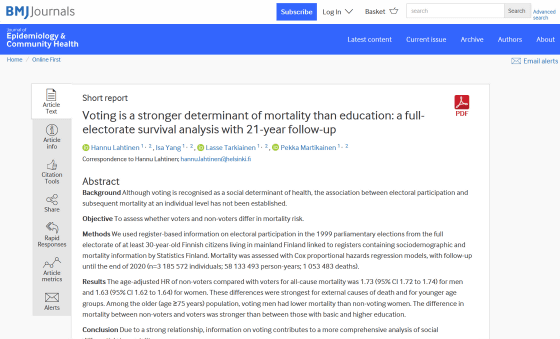Research shows that people who don't vote tend to die earlier

Voting is an important act that reflects public opinion in politics through voting, but some people may have experienced skipping the polls because they found it troublesome, or accidentally forgetting the voting day. A new study of more than 3 million people found a strong correlation between not voting in an election and an increased risk of death.
Voting is a stronger determinant of mortality than education: a full-electorate survival analysis with 21-year follow-up | Journal of Epidemiology & Community Health

Study of 3 million people finds non-voters tend to die earlier
https://www.psypost.org/study-of-3-million-people-finds-non-voters-tend-to-die-earlier/
We know that human health is shaped not only by genetics and lifestyle, but also by a wide range of social, economic, and environmental factors. From this perspective, the act of voting can be seen as a measure of how individuals interact with their communities and their ability to influence policies that affect their own well-being, such as healthcare and environmental quality.
While previous research has suggested a link between individual social participation and health, most of these studies have relied on questionnaire surveys, which may have been influenced by people's memories and aspirations. Therefore, a research team at the Institute of Demography and Population Health at the University of Helsinki in Finland investigated the relationship between social participation and health using the objective and recordable act of voting.
For this study, the research team obtained official voter lists from Statistics Finland covering all eligible voters in Finland for the 1999 parliamentary election. They matched this data with national administrative records, such as demographic data and death certificates, up to the end of 2020. They analyzed the relationship between voting behavior and mortality over the following 21 years for a total of more than 3.1 million Finnish residents who were 30 years old or older at the time of the 1999 election.
By adopting this method, the research team was able to examine the relationship between voting behavior and mortality while taking into account various factors related to mortality risk, such as age, gender, and educational background.

The analysis found a clear and significant difference in subsequent mortality rates between voters and non-voters. In an age-adjusted analysis, men who did not vote in the 1999 election had a 73% higher mortality rate over the next 21 years than men who voted. A similar pattern was observed for women, with women who did not vote having a 63% higher subsequent mortality rate than women who voted.
Furthermore, even after the research team incorporated educational attainment into the statistical model, the association between voting behavior and mortality remained very strong. The mortality gap between those who voted and those who did not was larger than the mortality gap between those who only had compulsory education and those who had completed tertiary education, highlighting the strong link between voting behavior and health.
When we looked at specific causes of death, we found that non-voters had twice the risk of dying from 'external' causes, such as accidents, violence, and alcohol-related illnesses, compared with voters, suggesting a potential link between non-voting and certain behaviors and circumstances.
The study also found differences by age and gender. The difference in mortality rates between voters and non-voters was highest among people under 50. Non-voters over the age of 75 also had a higher mortality rate than men of the same age. This is unusual, as women generally have a longer life expectancy than men.

This study only examined correlations, so it is unclear whether there is a causal relationship, such as whether not voting leads to poor health or whether underlying health problems or social barriers make it difficult to vote. It is also important to note that the analysis of voting behavior was based on only one election, so it does not necessarily reflect an individual's long-term voting week.
Regardless of the causal relationship, the researchers suggest that information on voting patterns could be a useful indicator for monitoring population health and identifying disparities. They also point out that there are concerns that people with high mortality rates are less likely to be represented in the polls, meaning their needs and health concerns receive less political attention.
Related Posts:
in Science, Posted by log1h_ik







